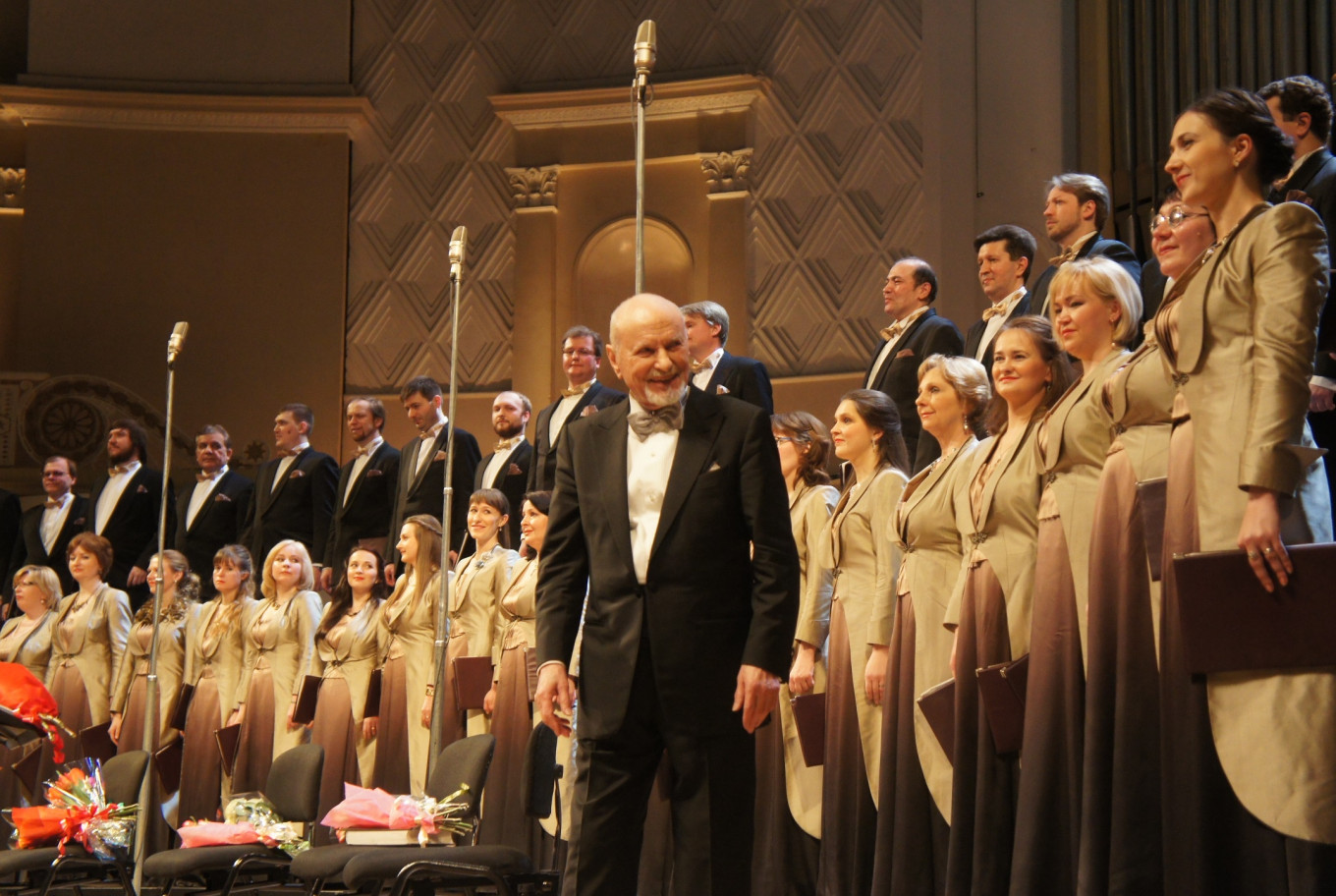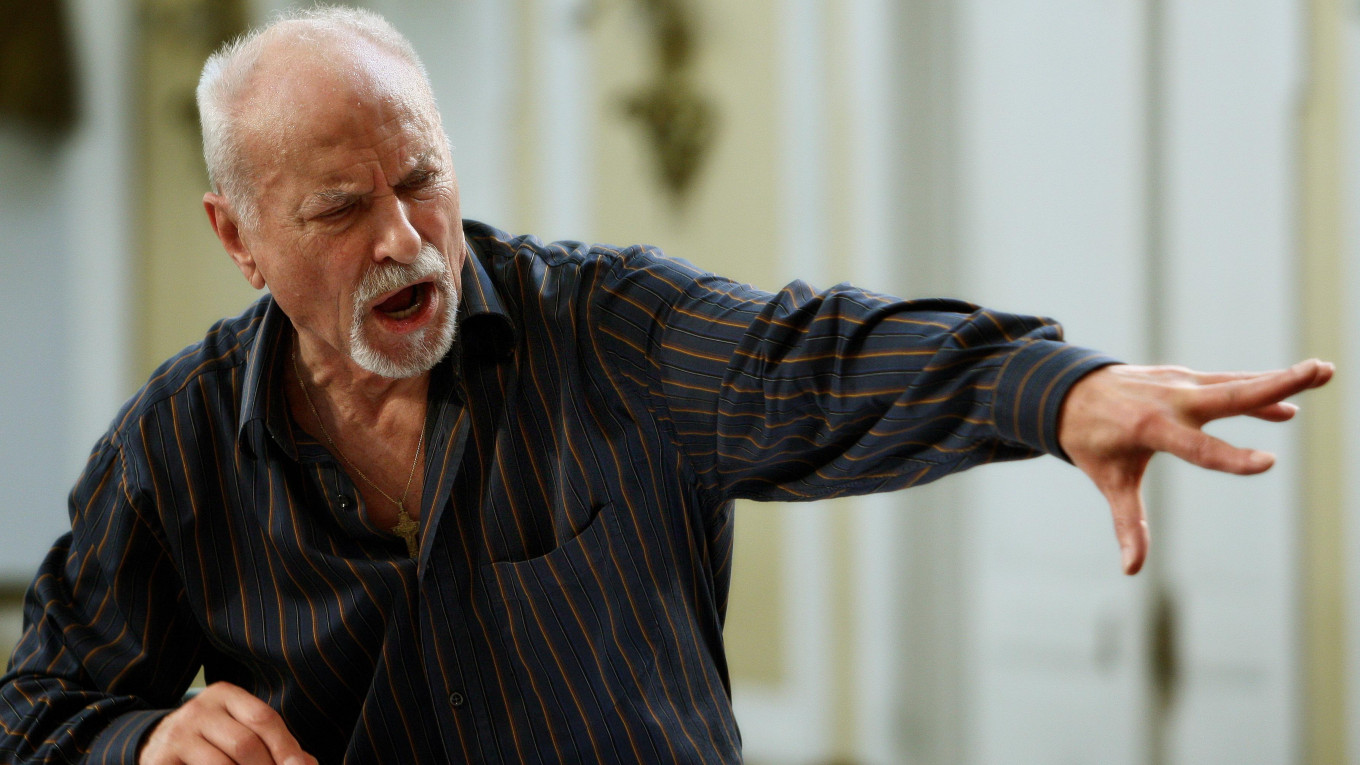When conductor Vladimir Minin founded the Moscow Chamber Choir in 1972, he had no idea that he would still be at the helm at the grand age of 88. But as the choir prepares to celebrate its 45th anniversary with a series of concerts over the Easter period, Minin is adamant that he has no immediate plans to step down from his post as artistic director.
“I don’t get tired when I’m at the conductor’s podium, it’s only afterward I feel weary,” he told The Moscow Times. Minin concedes that his retirement is approaching, though he will say only that he is currently grooming a successor to take the reins of the 42-member collective.
As part of its anniversary celebrations, Minin will be leading the choir in four concerts, one of which is an Easter concert at the Cathedral of Saints Peter and Paul on April 16, followed on April 27 by a grand anniversary performance in the Tchaikovsky Concert Hall.
The choir has won numerous awards both in Russia and abroad over the last 45 years at various festivals and competitions, and many of the leading lights of the Russian and international classical music world have performed alongside it: Russian mezzo-sopranos Irina Arkhipova and Elena Obraztsova, Spanish operatic soprano Montserrat Caballe, as well as leading Russian conductors Vladimir Spivakov, Yury Bashmet and Yury Temirkanov.
Minin founded the choir while rector of the Gnesin State Musical Pedagogical Institute, and the group’s first incarnation was drawn from students and teachers from the college. Over the years singers have come and gone, but Minin has remained a constant presence, driving the choir on to conquer new musical and geographical horizons.
Naturally, the end of the USSR brought great changes both in education and in music, as the country was exposed to new influences from the West. While Minin says that he doesn’t reject contemporary Russian pop music, he accuses it of sometimes having a “somewhat perverted character” and laments the decline in popularity of choral music.
“In the Soviet period it wasn’t great, but still, singing was taught in schools. Now there’s none.”

When asked what he considers to be the choir’s greatest achievements, Minin highlights winning the First International Choral Congress in Vienna in 1986, performing alongside “world-class singers like Elena Obraztsova and Yevgeny Nesterenko,” and “wonderful conductors” such as Spivakov, Bashmet and the late Yevgeny Svetlanov.
However, it is the choir’s first visit to the United States in the late Brezhnev era that remains one of his proudest moments: “Who could boast of going on a tour to America back in 1978? What musical group could say that?” he says.
The choir continues to tour the world and has performed on some of the greatest stages: Over 1.5 billion people heard the choir sing the Russian national anthem acappella at the 2010 Winter Olympics in Vancouver.
Yet, despite its successes, the choir has never had a place it could call home. The group rehearses in a children’s dance school in a space of just 60 square meters. “There’s nowhere for the sound to go!” Minin has said.
In recognition of its services to the state, the Moscow City Hall has allocated the choir a new premises of 1,138 square meters, but a number of obstacles have prevented the choir from moving in until now. The work will finally be complete by the end of this concert season.
Recent years have not been easy, with Minin surviving an attempt by part of the choir to remove him in the spring of 2014 — he was labeled as “the product of a long-gone era, dark, overwhelming.” He is sanguine about such setbacks, describing them as “the ups and downs” of the job.
But Minin has always been one to plough his own furrow, and over the years he has taken a number of risks. He took the bold step of including church music by composers such as Rachmaninoff and Tchaikovsky (“not recommended for performance”) in the choir’s repertoire as far back as 1973. Yet all the same, he does not go as far as to completely reject the role of ideology in Soviet music.
“You can approach an ideology in different ways: You can welcome it or dismiss it, but the main thing is that there is an ideology,” explains Minin.
“Now money has replaced ideology. And when ideology is replaced by money, the selection of a repertoire is dictated more by the market,” he says. “And when the government describes a performance as a ‘service,’ then it doesn’t fit any acceptable notions.“
A Message from The Moscow Times:
Dear readers,
We are facing unprecedented challenges. Russia's Prosecutor General's Office has designated The Moscow Times as an "undesirable" organization, criminalizing our work and putting our staff at risk of prosecution. This follows our earlier unjust labeling as a "foreign agent."
These actions are direct attempts to silence independent journalism in Russia. The authorities claim our work "discredits the decisions of the Russian leadership." We see things differently: we strive to provide accurate, unbiased reporting on Russia.
We, the journalists of The Moscow Times, refuse to be silenced. But to continue our work, we need your help.
Your support, no matter how small, makes a world of difference. If you can, please support us monthly starting from just $2. It's quick to set up, and every contribution makes a significant impact.
By supporting The Moscow Times, you're defending open, independent journalism in the face of repression. Thank you for standing with us.
Remind me later.






